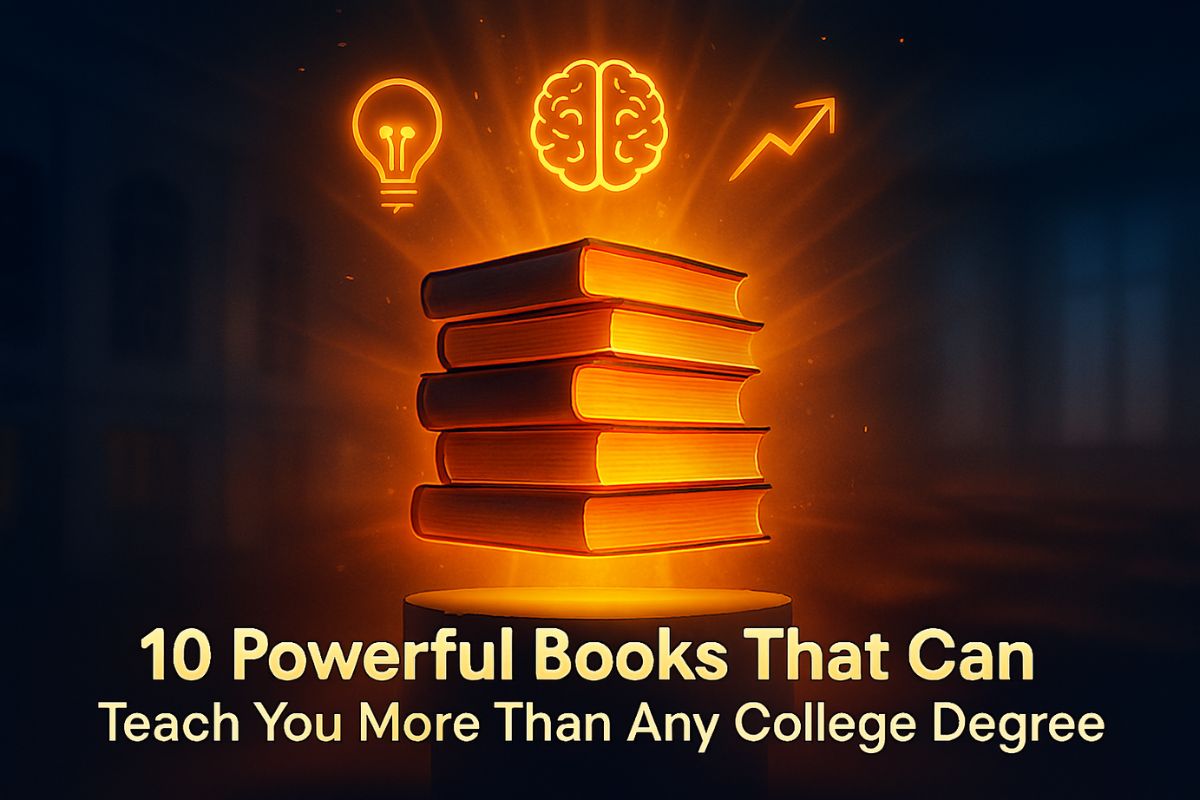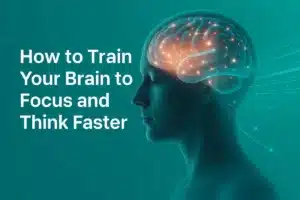Explore 10 powerful books that deliver more life skills, mindset shifts, and real-world knowledge than a traditional college education. This handpicked list is ideal for students, dropouts, professionals, and lifelong learners seeking practical wisdom and success without the classroom.
Is college still worth it?
With skyrocketing tuition fees, outdated textbooks, and rigid systems, more people are starting to question whether a degree is truly the best way to succeed in life. The truth is, formal education doesn’t always teach you how to think, earn, or grow in the real world.
The good news? Some books do.
Books have the power to transform your mindset, build real-life skills, and open doors to opportunities — without ever stepping into a classroom. Whether you’re a student, dropout, professional, or entrepreneur, the right books can give you a self-made education that’s far more practical and powerful than most college curriculums.
Let’s explore 10 powerful books that can teach you more than any college degree — and why they should be part of your personal learning journey.
Why Books Can Be Better Than College
1. Practical Wisdom Over Theory
College often focuses on abstract theories, while great books are filled with real-life examples, actionable insights, and stories that teach lessons you can apply immediately.
2. Cost-Effective Learning
Why spend ₹5–10 lakhs on a degree when a ₹500 book can give you insights that generate 10X returns in your life or career?
3. Learn at Your Own Pace
Books give you flexibility — read, pause, re-read, or apply insights in your own time. No exams. No pressure.
10 Books That Teach More Than a College Degree
Each of these books is a masterclass in itself — covering areas like money, productivity, mindset, communication, entrepreneurship, and purpose.
1. Rich Dad Poor Dad – Robert Kiyosaki
Main Lesson: Understand money the way the rich do.
Why It Beats College: Most schools don’t teach personal finance — this book does.
Kiyosaki contrasts two father figures — one highly educated but poor, the other with no college degree but financially free. The book breaks down assets vs liabilities, the importance of financial education, and how to make money work for you.
Key Takeaways:
- Invest early
- Build assets
- Avoid lifestyle inflation
2. The 7 Habits of Highly Effective People – Stephen Covey
Main Lesson: Personal and professional effectiveness.
Why It Beats College: Offers a framework for living, leading, and making impactful decisions.
Covey’s timeless habits — like “Be Proactive” and “Begin with the End in Mind” — provide deep self-leadership lessons no classroom teaches.
Key Takeaways:
- Focus on what you can control
- Build character over personality
- Align actions with long-term goals
3. Atomic Habits – James Clear
Main Lesson: Small habits = massive results.
Why It Beats College: Practical guide to behavior change and personal mastery.
James Clear explains how to build better habits by focusing on identity change, not just goals. Unlike traditional education, this book teaches how to change your life from the inside out.
Key Takeaways:
- Habit stacking
- Environment design
- Tiny gains = exponential growth
4. Deep Work – Cal Newport
Main Lesson: Master the ability to focus.
Why It Beats College: Teaches how to think in a distracted world — something every student/professional needs.
In a world full of distractions, Cal Newport shows how deep, focused work leads to true success and creativity. This is what makes professionals irreplaceable.
Key Takeaways:
- Schedule deep focus time
- Eliminate shallow tasks
- Value craftsmanship
5. So Good They Can’t Ignore You – Cal Newport
Main Lesson: Passion is overrated — skill is king.
Why It Beats College: Disrupts the “follow your passion” advice often heard in college.
Newport argues that passion comes after mastery. Learn valuable skills first, and passion will follow. A direct lesson against mindless degree-chasing.
Key Takeaways:
- Build rare & valuable skills
- Seek autonomy
- Be a craftsman, not a dreamer
6. Thinking, Fast and Slow – Daniel Kahneman
Main Lesson: Understand how you think and make decisions.
Why It Beats College: Teaches critical thinking better than most psychology courses.
This Nobel-winning psychologist explains the two systems in your brain — fast, emotional thinking and slow, logical thinking — and how they impact your judgment, money, and life.
Key Takeaways:
- Beware of cognitive biases
- Use slow thinking for big decisions
- Don’t trust your gut blindly
7. The Lean Startup – Eric Ries
Main Lesson: Build, measure, learn — fast.
Why It Beats College: A crash course in modern entrepreneurship.
This book teaches how to validate business ideas quickly, minimize waste, and scale with agility. Better than a year of MBA lectures.
Key Takeaways:
- Start small (Minimum Viable Product)
- Test before you scale
- Embrace customer feedback
8. How to Win Friends and Influence People – Dale Carnegie
Main Lesson: Master human relationships.
Why It Beats College: Teaches emotional intelligence and communication — skills no textbook can replace.
From listening skills to handling criticism, Carnegie’s timeless advice is a must-read for anyone who wants to lead, sell, or succeed.
Key Takeaways:
- Speak in terms of others’ interests
- Remember names
- Never criticize, condemn, or complain
9. Man’s Search for Meaning – Viktor Frankl
Main Lesson: Find purpose in suffering.
Why It Beats College: Teaches resilience, purpose, and the power of perspective.
Written by a Holocaust survivor and psychologist, this book explores how finding meaning is the key to surviving hardship — and thriving.
Key Takeaways:
- Meaning over happiness
- Choose your response, even in suffering
- Purpose drives performance
10. The Almanack of Naval Ravikant – Eric Jorgenson
Main Lesson: Build wealth and happiness from first principles.
Why It Beats College: Combines business, philosophy, and mental models in one book.
Naval Ravikant’s distilled wisdom on money, leverage, and decision-making is a must-read for every future thinker and doer.
Key Takeaways:
- Play long-term games with long-term people
- Learn to sell and build
- Wealth is freedom, not luxury
Expert Tips: How to Get the Most Out of These Books
- Don’t just read — highlight, take notes, and reflect
- Apply one lesson from each book in your daily life
- Join online forums or book clubs for accountability
- Use apps like Notion or Obsidian to store and review takeaways
Common Mistakes to Avoid
- Reading for entertainment only — these are learning tools
- Skipping application — knowledge without action is wasted
- Comparing yourself with others — learn at your own pace
- Consuming too many books without mastering one
Free Resources
- Goodreads – to track your reading progress
- Readwise – to save and review highlights
- YouTube Summaries – for quick overviews before deep reading
- Free PDFs – Many books are available legally in the public domain
- Schoolication’s Wisdom Insights – curated wisdom for self-learners
Conclusion
You don’t need a ₹10 lakh degree to succeed in life. You need the right mindset, habits, and knowledge — all of which can be found in books.
These 10 books are not just great reads. They’re life-changing tools. So, choose one, dive deep, and apply its wisdom. Your self-education journey can start today.
📢 Like this blog?
Comment your favorite book, share it with a friend, and explore more self-learning content on Schoolication.com.
FAQs
1. Can books really replace a college degree?
Books can’t replace a certificate, but they can deliver deeper, more practical knowledge — especially in finance, entrepreneurship, mindset, and personal growth.
2. Which book is best for financial education?
Start with Rich Dad Poor Dad — it’s simple, impactful, and eye-opening.
3. Are these books suitable for teenagers or college students?
Yes! These books are perfect for young learners, working professionals, and entrepreneurs alike.
4. How often should I read a book?
Aim for 1–2 books a month, but focus more on application than speed.
5. Do I need to take notes while reading?
Yes — taking notes or highlighting key lessons helps you retain and implement what you learn.
6. Can I find these books in Hindi or regional languages?
Most of them are available in multiple Indian languages, both online and in bookstores.


